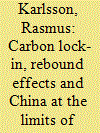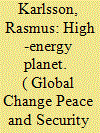| Srl | Item |
| 1 |
ID:
117010


|
|
|
|
|
| Publication |
2012.
|
| Summary/Abstract |
From the beginning, the statist frame of the Kyoto Protocol has invited a focus on national carbon budgets and piecemeal mitigation within rich countries. Despite the Clean Development Mechanism and other efforts to diffuse low carbon technologies to developing countries, China has over the last decades continued to construct hundreds of new thermal coal power plants leading not only to skyrocketing emissions in the present but also to long-term carbon lock-in. In light of this, China is likely to continue to put strong upward pressure on global emissions for many decades to come. Ignoring the seriousness of this situation, many rich countries have persisted to seek marginal improvements to intermittent low-energy sources such as wind power rather than taking the lead in developing breakthrough baseload technologies such as nuclear fusion. This paper argues that only such high-energy technologies, if made significantly cheaper than any fossil alternatives, will be capable of breaking the current carbon lock-in process in China and other developing countries.
|
|
|
|
|
|
|
|
|
|
|
|
|
|
|
|
| 2 |
ID:
161329


|
|
|
|
|
| Summary/Abstract |
A key part of the ecomodern discourse of a ‘Good Anthropocene’ is the vision of a ‘high-energy planet’ characterized by universal access to modern energy. Recognizing the crucial historical role that rising energy consumption has played in driving social transformations, ecomodernists imagine a future with substantial global equality of opportunity powered by clean and abundant energy. Whereas traditional environmental thinking has advocated land-intensive distributed forms of renewable energy, ecomodernists have argued that such technologies are fundamentally incompatible with a world in which 7–10 billion people can live modern lives. Instead, ecomodernists believe that only breakthrough innovation can overcome the current political and cultural polarization surrounding climate change and provide a unifying pathway towards climate stability. Yet, resurging populism and nationalism, but also the statist frame of the United Nations Framework Convention on Climate Change process, make such a future unlikely as rich countries remain focused on meeting their own domestic emissions targets rather than decarbonizing the global economy as a whole. As a consequence, overall political polarization is bound to increase as radical environmental voices will call for ever harsher demand-side reductions while technocratic elites may come to see solar radiation management as the only feasible way of preventing an irreversible destabilization of the climate system.
|
|
|
|
|
|
|
|
|
|
|
|
|
|
|
|